Are you wondering “how long does it take to build a house?” If so, you’re in the right place.
Read on to learn about timelines, things to consider, and other factors.
How Long Does It Take to Build a House?
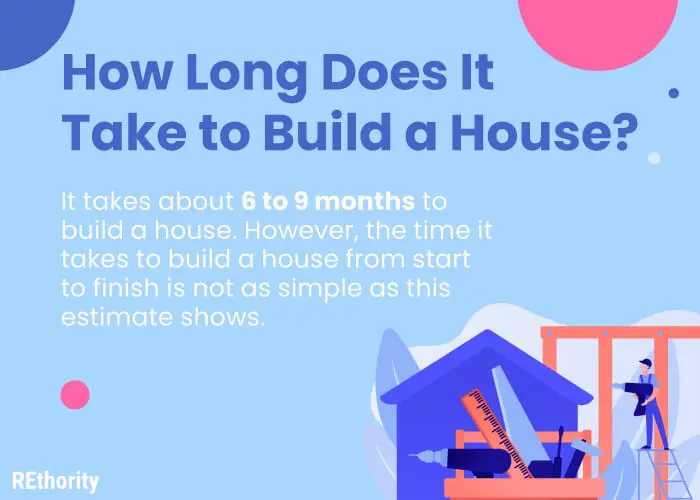
The short answer: It takes about 6 to 9 months to build a house. However, the time it takes to build a house from start to finish is not as simple as this estimate shows.
There are several steps in the process and multiple factors that can speed up or slow down the construction of a home.
We’ll look at all of these factors, what kind of progress to expect in each step, and show you how long each step should take next.
Pre-Construction
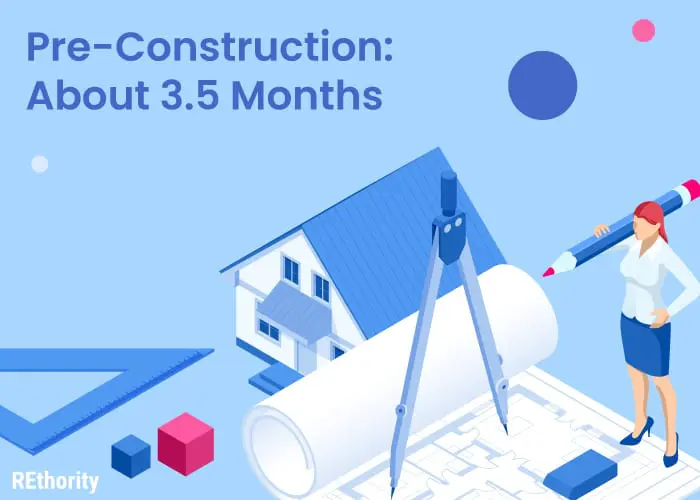
Secure Your Financing. Don’t underestimate the amount of time it takes to get a construction loan. This is often the first delay a hopeful new homeowner will experience when they decide to build a home.
It can take about two months to get financing to move forward with the project.
Find Your Contractor. Asking around locally is the best way to find a trustworthy contractor who does good work. If you’re not sure who the local contractors are, you can search online to find them and look for any reviews or complaints they may have.
Starting with the Better Business Bureau can give you peace of mind that you’re choosing the right contractor to make your house dreams a reality.
Inspections and Permits. Before you can actually start construction on your house, you’ll need a building permit and approval from your town, city, or county.
This step ensures your new home will comply with the local building codes and that the structure will be safe. You won’t be immediately issued your permit, so allow about two weeks for this step.
Check for Easements. Another critical factor that can affect the construction of your home are easements. Anywhere a sidewalk, sewer line, power line, or neighbor’s driveway passes through your property is considered an easement.
Make sure you check with your county assessor’s office or website to see if any easements are currently in effect. If you’re able to check online, you can take care of this step in just a few minutes.
Prepare the Land. The land where the home will be built must be cleared before you can build there. Anything that gets in the way of construction has to go, including any large rocks, trees, and brush.
Depending on how much land needs to be cleared before construction can start, this process can take anywhere from 1-3 days. Grading and leveling the ground to lay the foundation can take about a month.
Starting Construction
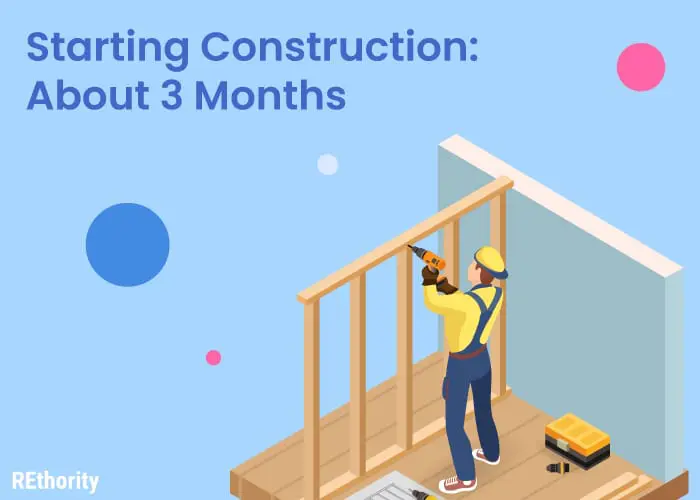
Framing the House. After the foundation is laid, the next step is framing the house, or creating the sturdy wooden structure that the home will be built on.
Framing an average-size house, assuming perfect weather, can take about two months to complete. Windows may be nailed directly into the frame of a new construction house.
Installing the Roof. Once the framing is done, the roof will go up. It takes about a day for a crew to install a new roof, but different roof styles can take a few more days (if there are several peaks or an unusual shape).
Siding, Plumbing, and Electrical. Siding (or masonry work) is the next step in the construction process. Once the roof is in place, and the siding is up, the home is protected from rain.
This means you and your contractors can start working on the wiring, HVAC system, and plumbing inside the house. Siding, wiring, and electrical work should take about one month to complete. You’re getting close to completing construction now!
Finishing Construction
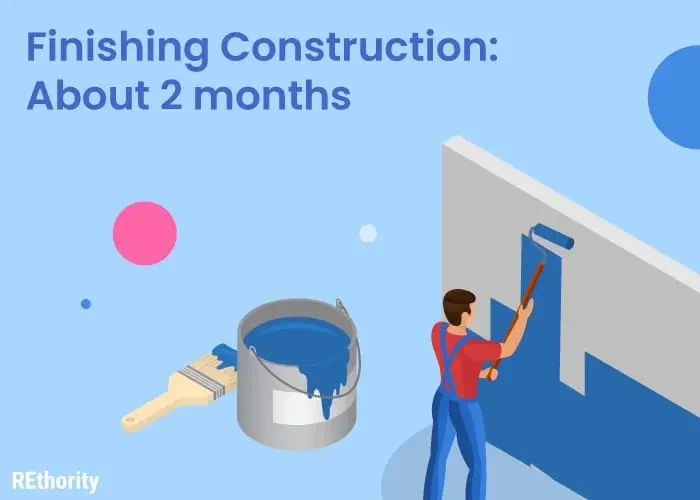
Finish the Interior. Finishing the inside of the home is the next step in building a house. Right now, the walls are still just empty framing, and the floor is just the foundation.
In this step, it starts to look like a “real house” inside with drywall, cabinets, and other carpentry work being completed. This part takes about two months.
Trim and Finish Work. Floors will be installed according to your specifications, the walls (now covered with drywall) will be painted, and caulking will be done around sinks, showers, tubs, doors, and windows.
Baseboards and other trim will go up, along with lighting fixtures, ceiling fans, and any additional work on the electrical, HVAC, or plumbing systems. This step can take about a week.
Final Walkthrough. The last step you’ll take before your home is officially finished is a final walkthrough with your contractor. Any additional detail that may be missing or not quite right is addressed at this point. Your contractor also makes sure everything is up to code.
Factors That Delay Construction on a House
Several things can cause delays as you’re building a house. Factors from weather to building codes can throw things off the average 6 to 9-month schedule.
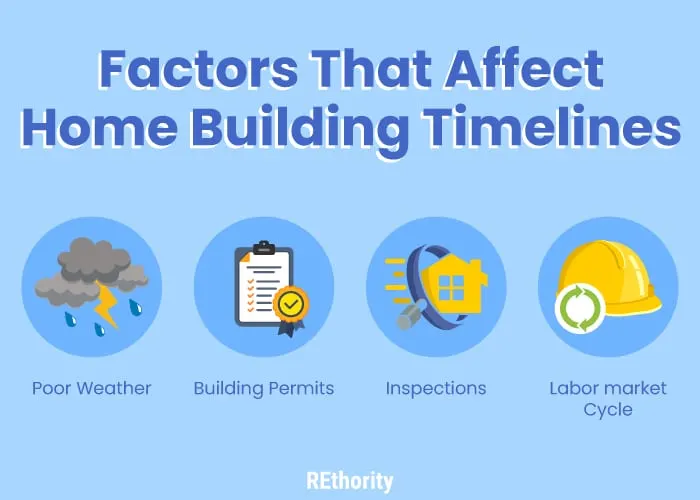
The best way to quickly get back on track after a delay is to know what delays you may experience during the construction process. We’ll take a look at some of the different things that affect the timeline of your house build.
Poor weather. A succession of rainy days can really slow or stop construction by making specific tasks impossible. Once the roof, doors, and windows are in place, poor weather doesn’t have as much of an effect on the construction.
Building permits and codes. Whether it’s an easement on your property that you didn’t know was there or unapproved building plans, lots of issues can cause your building permit to be delayed. This prevents any construction from happening until the issues are fixed.
Inspections. If any part of your newly built house doesn’t pass inspection, you won’t be able to move forward with the project until you or your contractor can fix the issue.
Inspections often happen two to three times throughout construction, once when things have been roughly installed and again when construction is complete.
Contractor workload and availability. During the summer months, more houses are built, and contractors are making more home improvements on existing homes.
This means if you decide to build during the busy summer season, you may have to wait for your contractor to have an opening in their schedule.
Delayed design choices. If you don’t pick out your preferred finishes, cabinets, and colors early in the process, those choices can end up delaying construction on your home. Custom cabinets and finishes may add 7-9 additional weeks to complete your order.
Custom builds. It takes several more months (10-16 months compared to 6-9 months) to complete a custom-built home rather than one from standard blueprints, and delays are more likely to come up if the builders are bringing a blueprint to life for the first time ever. Larger homes also take more time.
Location of the build. Different regions of the United States have different averages for the amount of time it takes to build a house from start to finish. Cold weather and rainy seasons can add to the difference.
On the Atlantic coast, it takes about 9 ½ months to complete construction on a house. The Mountain region’s average is closer to 6 months. In metropolitan areas, most new homes can be completed in less than seven months. In rural areas, that estimate is closer to 9 months.
Unavailability of materials. Sometimes, necessary materials or those you’ve chosen for the exterior or interior of the house just won’t be available. Backorders, insufficient amounts of materials available, or other factors affect build times.
These include construction projects happening at once can make it hard to get all the needed materials and supplies for your house. This doesn’t usually take long to resolve, but it can set you back a week or more.
So, How Long Does It Take to Build a House?

If you’re certain that building a house is what you want, you should know the general timeline from start to finish.
While the estimate is that it takes between 6 to 9 months to complete construction on a single-family home of average size, that estimate may not apply in other circumstances.
We’ve seen that the amount of time it takes to build a house varies based on several factors, like:
- Location of the build
- Materials and design choices
- Contractor availability
- Weather problems
- Custom built/standard plans
- Size of the home
- Inspections
- Building permits and codes
- Financing
- Contractor problems
You can reduce the number of delays you face during the construction of your new home by being aware of what the typical delays are and taking steps to avoid them.
For example, starting construction on your house in late summer or late winter can help you avoid scrambling to find workers mid-summer, the busiest season for contractors and builders.
Now you can see how long it takes to build a house in different areas of the United States, are you preparing to secure your financing and start building the home of your dreams?
Resources:

